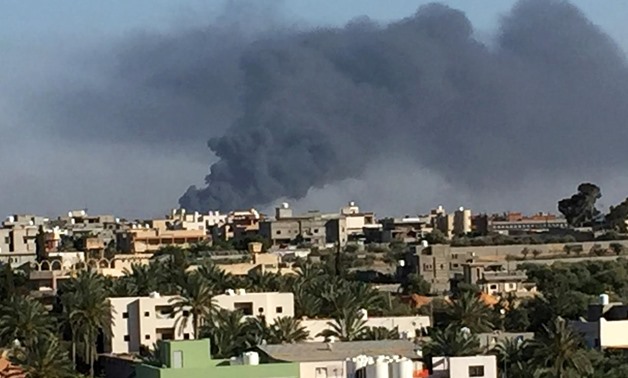
FILE PHOTO: Smoke rises during a fight between members of the Libyan internationally recognised government forces and Eastern forces in Ain Zara, Tripoli, Libya May 5, 2019. REUTERS/Ayman al-Sahili
CAIRO - 19 January 2020: Berlin conference on Libya Kicked off Sunday with the aim of concluding a truce between warring parties and paving the way for reconstruction under an elected civilian government.
The conference is attended by Prime Minister of the Government of National Accord (GNA) Fayez al-Sarraj, Commander of the Libyan National Army (LNA) Khalifa Haftar and UN Envoy to Libya Ghassan Salame, Russian President Vladimir Putin, U.S. Secretary of State Mike Pompeo, UK Prime Minister Boris Johnson, Egyptian President Abdel Fatah al-Sisi Algerian President Abdul Majeed Tebboune, Emirati Foreign Minister Abdullah bin Zayed bin Sultan Al Nahyan, Turkish President Recep Tayyip Erdoğan, Chairperson of African Union Commission (AUC) and Arab League Secretary General Ahmed Abul Gheit.
Germany had earlier declared that the countries taking part in the conference include the United States, Russia, China, France, Italy, United Kingdom, Turkey, and others. The Tunisian president declined the invitation to attend the conference because it was late. The Tusinisian Armed Forces stated on Saturday that drones were flying on the Libyan side of shared borders, and that the Air Force is ready to down them if they enter Tusnisian airspace.
TASS acquired Saturday draft conclusions focusing on six “baskets” that are the termination of all military movements in support of warring parties; establishment of unified security agencies, enforcement of UNSC sanctions against violators; creation of an International Follow-Up Committee (IFC); declaration of a truce and militias dismantling; and launching of a reconstruction program.
Spokesperson of the Libyan National Army (LNA) Ahmed al-Mesmary announced on the same day that Libyan tribes and people had shut down oil fields and ports as the revenues have been used by GNA to pay for foreign fighters.
It is worthy to mention that the GNA is a non-elected UN-recognized interim government that is based in Tripoli and protected by militias. On the other hand, the elected Libyan House of Representatives convenes in Tobruk while the General Command of the Libyan Armed Forces known as Libyan National Army (LNA) is located in Benghazi.
The National Oil Corporation (NOC), headquartered in Tripoli, declared that the General Command of the Libyan Armed Forces and the Petroleum Facilities Guard ordered the administrations of Sirte Oil Company, Harougue Oil Operations, Waha Oil Company, Zueitina Oil Company, and Arabian Gulf Oil Company to stop exports from the ports of Sider, Zueitina, Harigua, Brega, and Ras Lanuf.
The negotiations held in Moscow on January 14 by Commander of the Libyan National Army (LNA) Khalifa Haftar and Prime Minister of Tripoli-based Government of National Accord (GNA) Fayez al-Sarraj ended without reaching a truce agreement.
The LNA had announced earlier on the same day that it would not withdraw from the territories it conquered in Tripoli’s outskirts, and that it is determined to free the entire Libyan soil from militias and terror groups.
A ceasefire between both parties started on January 12; however, the LNA and Speaker of the Libyan House of Representatives Aguila Saleh announced on the same day that militias affiliated to Tripoli-based GNA had violated the ceasefire. Nevertheless, the LNA affirmed its commitment to the ceasefire.
The following day, the Libyan foreign ministry issued a statement requesting the international community to fulfill its duties by pressuring GNA-affiliated militias to surrender and give up their weapons obeying the Libyan people’s will.
Anadolu Agency reported that the LNA is amassing southern Tripoli while Al Arabiya announced that clashes resumed in Salahuddin district south of Tripoli.
On January 6, LNA captured Sirte and was advancing towards Misrata after entering Tripoli’s outskirts.
On January 8, Turkey declared sending 35 soldiers to Libya claiming they would not take part in combat. Nevertheless, Libya Review publication reported on January 11 that three Turkish soldiers were killed in Libya, and six others were injured. The bodies were brought to Misrata airport while the injured have received treatment at Nalut hospital near Tripoli.
Later in December, the Syrian Observatory for Human Rights (SOHR) reported that 300 militants affiliated to Turkey have been relocated to the Libyan capital from Syria and that 900-1,000 militants moved to Turkish camps to receive training.
Earlier in the same month, Turkey and GNA signed two MoUs pertinent to military cooperation and maritime border demarcation.


Comments
Leave a Comment